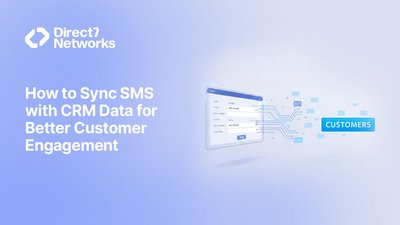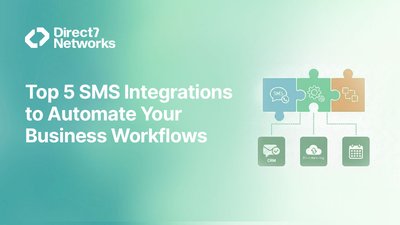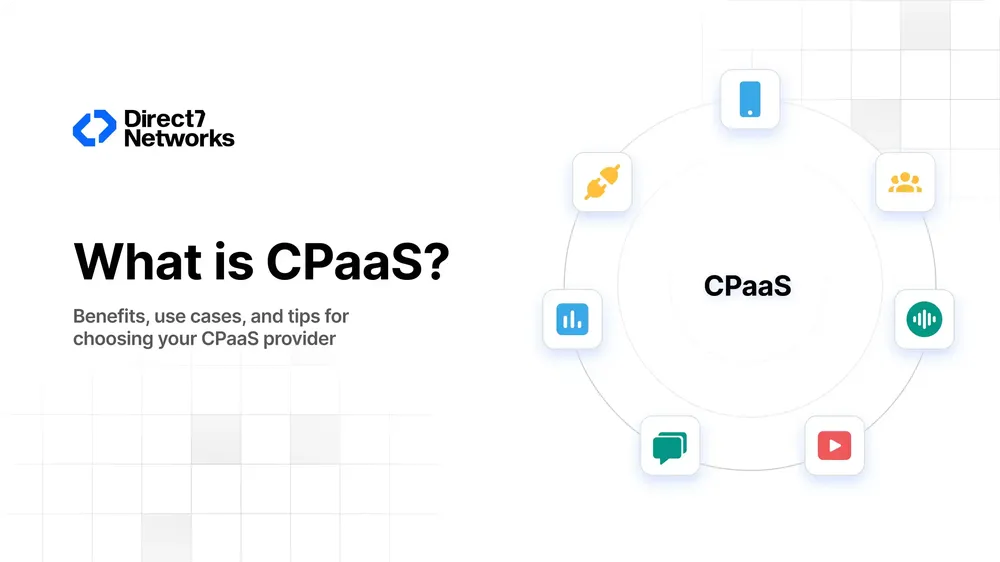
What is CPaaS? Benefits, use cases, and tips for choosing your CPaaS provider
Effective communication is essential for business success in today's rapidly changing digital world. As customer expectations increase and technological advances pave the way for new solutions, businesses are looking for ways to stay ahead. One solution that has become very popular is Communications Platform as a Service (CPaaS). CPaaS is changing the way businesses communicate with their customers. It offers seamless integration of messaging, voice, video, and more into existing applications.
This article delves into the concept of CPaaS, exploring its benefits, key functions, and how to choose the best CPaaS provider for your business needs. Whether you are looking to strengthen customer engagement Improve operations or compete in your industry Understanding CPaaS and its capabilities will be a game changer for your communications strategy.
What Is CPaaS?
Communication Platform as a Service, or CPaaS, is a cloud-based platform that enables businesses to integrate video, audio, text, email, and other communication features. Compatible with existing applications, CPaaS provides APIs (Application Programming Interfaces) and SDKs (Software Development Kits) for developers. So that they can build just the backend infrastructure without embedding these communication features seamlessly.
Unlike traditional communications systems, CPaaS offers scalability, flexibility, and cost-effectiveness. It allows businesses to create custom communications solutions to suit their specific needs. Promoting better customer engagement and operational efficiency, CPaaS also supports industries as diverse as healthcare, retail, finance, and logistics. Making it a versatile choice for modern businesses.
What is a CPaaS Provider?
CPaaS providers are companies that provide the infrastructure and tools needed to integrate communications functionality with business applications. These providers provide APIs, SDKs, and comprehensive documentation to facilitate the development process.
Popular CPaaS providers include D7 Networks, Twilio, Vonage, and others. Each provider offers unique features, pricing models, and support levels. to meet different business needs By leveraging a CPaaS provider, businesses can focus on delivering a better user experience without worrying about managing the communications infrastructure.
Additionally, CPaaS providers often offer customer support. Analysis tools and customizable solutions These features help businesses Optimize communication strategies and maintain competitive advantage.
What is the Difference Between CPaaS and UCaaS?
Although CPaaS and Unified Communications as a Service (UCaaS) aim to improve communications, But it meets different needs:
- CPaaS: A developer-focused platform that provides APIs to embed communications capabilities into existing applications. Ideal for businesses looking for a tailored communications solution.
- UCaaS: A ready-made suite of communications tools, including audio, video, text, and conferencing, typically offered as a subscription service. Ideal for businesses looking for an out-of-the-box solution.
| Feature | CPaaS (Communication Platform as a Service) | UCaaS (Unified Communications as a Service) |
|---|---|---|
| Focus | Developer-centric, offering APIs for integration | End-user focused, providing pre-built tools |
| Customization | Highly customizable to fit business needs | Limited customization, predefined solutions |
| Implementation | Requires development and integration efforts | Ready-to-use with minimal setup required |
| Target Users | Businesses with specific communication needs | Businesses needing an all-in-one solution |
| Scalability | Easily scalable based on business growth | Scalable within the limits of the platform |
| Communication Channels | Voice, video, messaging, email, and more (integrated via APIs) | Voice, video, messaging, conferencing (pre-packaged) |
| Infrastructure | Businesses build their own using provider APIs | Fully managed by the service provider |
| Cost Structure | Pay-as-you-go based on API usage | Subscription-based pricing |
| Ideal For | Businesses wanting to integrate communication into existing applications | Businesses seeking an all-in-one communication suite |
Essentially, CPaaS is about customization, while UCaaS focuses on comprehensive pre-built solutions. Understanding these differences helps businesses. Choose the right technology for their operational needs.
How Does CPaaS Work?
CPaaS works by providing developers with APIs and SDKs that integrate communications functionality into their applications. Here is a simple workflow:
- API Integration: Developers integrate CPaaS APIs with their software to enable communication features such as SMS, voice calling. or video conference
- Cloud Infrastructure: The CPaaS provider's cloud infrastructure manages the backend processes. This includes message routing and guaranteed uptime.
- Real-time analytics: CPaaS platforms often include dashboards and analytics tools. that provides insights into communication performance
Additionally, CPaaS solutions are designed to be easy to use. It allows businesses to quickly implement and increase efficiency. By eliminating the need for extensive infrastructure, CPaaS reduces development costs and accelerates project timelines.
The ability to leverage these functionalities makes CPaaS a game changer for businesses looking to compete in the modern marketplace.
CPaaS is a game-changer for businesses aiming to stay competitive in the modern market.
Benefits of CPaaS
CPaaS has several advantages that make it a popular choice for businesses:
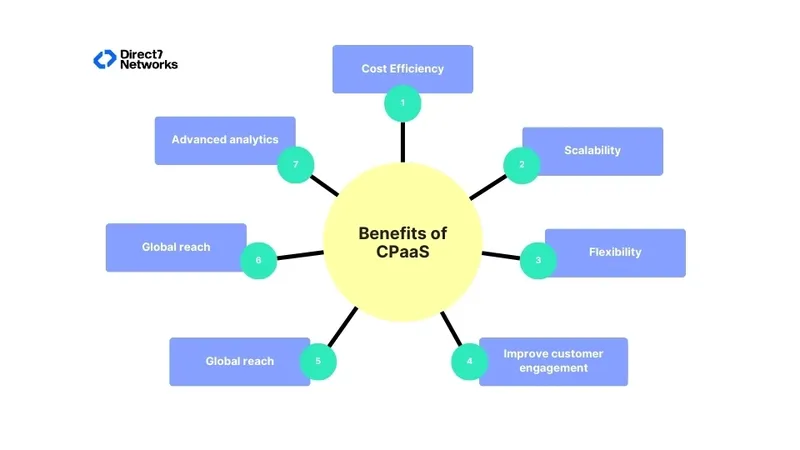
- Cost Efficiency: Avoid the costs of building and maintaining communications infrastructure.
- Scalability: Easily scale up or down as needed.
- Flexibility: Customize communications solutions to meet specific business needs.
- Improve customer engagement: Improve user experience with seamlessly integrated communication tools.
- Faster time-to-market: Accelerate application development by leveraging pre-built APIs and SDKs.
- Global reach: Connect with customers around the world without the need for local infrastructure.
- Advanced analytics: Gain actionable insights into your communication performance and customer behavior.
CPaaS also supports real-time communication. This ensures that the business can quickly respond to customer needs. This immediate response promotes trust and loyalty. This is critical to long-term success.
These benefits demonstrate how CPaaS can empower businesses to adapt to changing customer expectations and market demands.
Request a free demo to experience seamless integration for your business.
What Are the Key Functions of CPaaS?
The CPaaS platform offers a variety of functionalities such as:
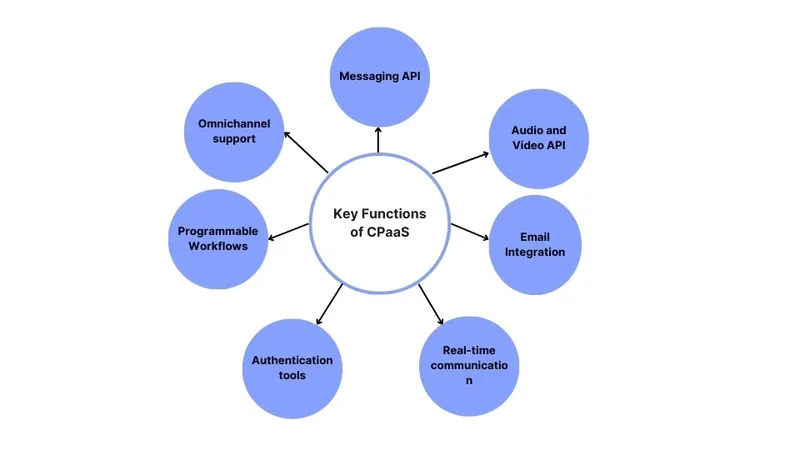
- Messaging API: Enables SMS, MMS, and chat capabilities.
- Audio and Video API: Facilitates voice calling. video conference and interactive voice response (IVR) systems.
- Real-time communication: Supports features like live chat and push notifications.
- Authentication tools: Includes two-factor authentication (2FA) and OTP (one-time password) services.
- Programmable Workflows: Automate customer interactions through predefined workflows.
- Omnichannel support: Integrate multiple communication channels. This ensures a consistent customer experience.
Additionally, CPaaS helps businesses Internal operations can also be improved. For example, automated data can improve employee coordination. while analytical tools help optimize resource allocation.
The versatility of CPaaS functionality allows businesses to create highly customizable communications solutions that align with their goals.
CPaaS Use Cases by Industry
CPaaS serves as a multi-purpose communication tool across industries. Here are some prominent use cases.
Health care
- Appointment reminders and confirmations
- Telehealth services with video and audio integration
- Secure patient communications using encrypted messages.
- Emergency alerts and notifications
Retail and e-commerce
- Real-time order updates and tracking
- Personalized marketing campaigns via SMS and email
- Customer support via chatbot and live messaging
- Seamless integration of loyalty program updates
Finance and Banking
- OTP for secure transactions and account verification
- Fraud Investigation Alert
- Personal financial advice via text messaging
- Virtual consultations using video APIs
Logistics and transportation
- Real-time shipping tracking information
- Coordinate drivers and deliver via message
- Automatic shipping and scheduling updates
- Collecting customer opinions via SMS surveys
Education
- Online class information and reminders
- Student support using live chat or video API
- Parent-teacher communication forum
- Notification of exam results.
Hospitality
- Booking confirmed and updated.
- Personalized offers for returning customers
- Customer service via live chat
Tips for Choosing Your CPaaS Provider
Choosing the right CPaaS provider is essential to achieving your business goals. Consider these tips:
- Understand your needs: Identify the communication features your business needs.
- Evaluate features and APIs: Make sure the provider offers an API that meets your specific needs.
- Look for scalability: Choose a platform that can grow with your business.
- Evaluate reliability: Choose a provider with high uptime and strong infrastructure.
- Consider Pricing Models: Compare pricing structures and find the solution that fits your budget.
- View support and documentation: Comprehensive documentation and responsive support can make integration challenges easier.
- Review security measures: Make sure the service provider adheres to industry security standards. and offers features such as encryption and secure data storage.
- Test the platform: Many providers offer free trials or demos. Use these to evaluate performance and compatibility.
- Consider ease of integration: Choose a provider whose API and SDK align with your existing technology stack.
- Analyze customer reviews: Get insights from other users to assess a provider's reliability and support quality.
In addition to these tips, Businesses should also consider the provider's reputation and industry expertise. Established providers with a proven track record are often more reliable and better equipped to handle complex needs.
By following these tips, businesses can choose a CPaaS provider that aligns with their strategic goals.
Conclusion
CPaaS has revolutionized the way businesses approach communications. They offer flexible and scalable solutions to meet a variety of needs. By understanding what CPaaS is, its benefits, and how to choose the right provider, businesses can open up new opportunities for growth and customer engagement. Whether you are a startup or an established organization. Leveraging CPaaS can provide the competitive advantage needed in today's dynamic market.
The future of communications lies in innovation and adaptability, and CPaaS is at the forefront of this change. By using this technology Business can help build stronger relationships. As the demand for seamless communication increases by improving operational efficiency and providing a better customer experience, CPAS will undoubtedly play a key role in shaping the future of business communications.

